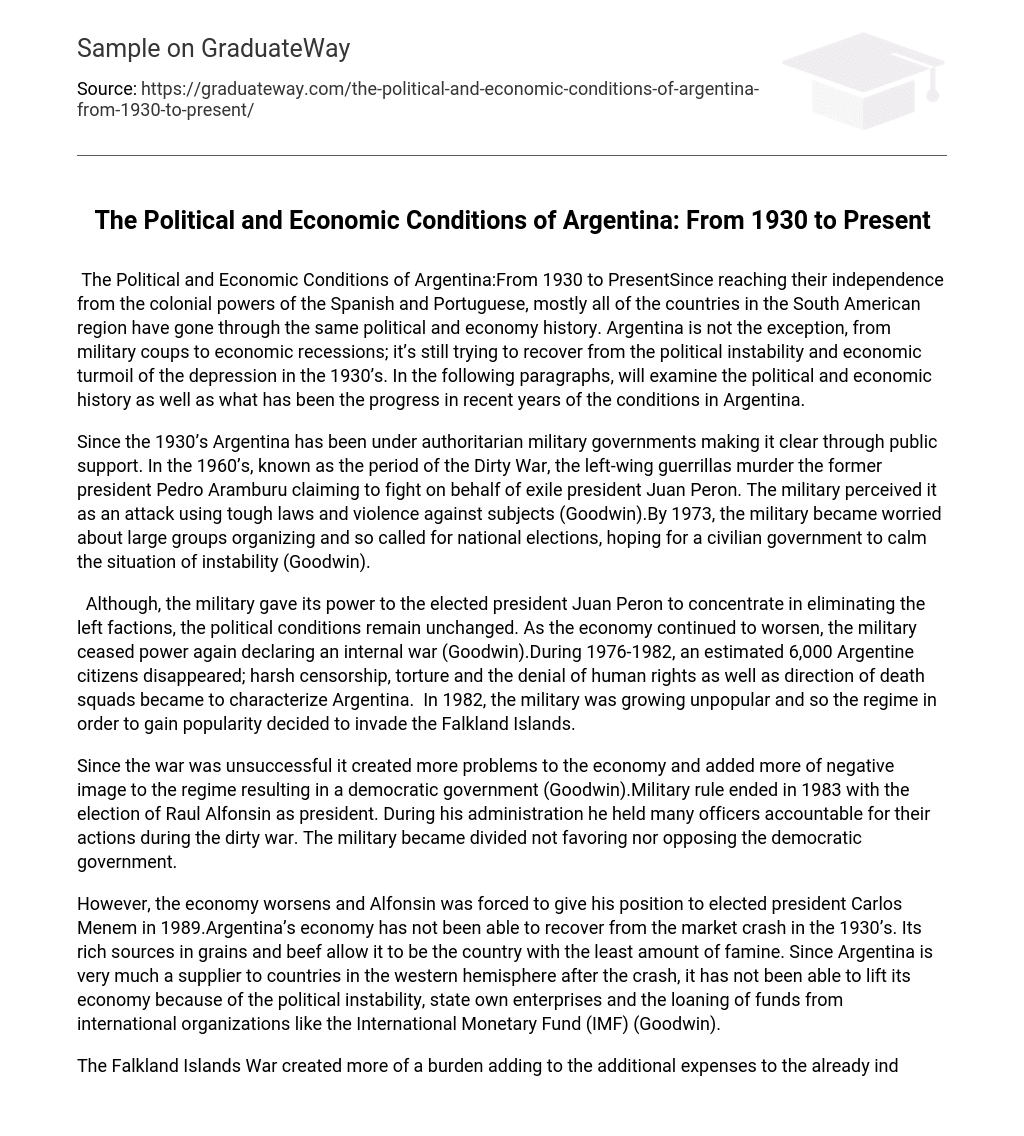The Political and Economic Conditions of Argentina:From 1930 to PresentSince reaching their independence from the colonial powers of the Spanish and Portuguese, mostly all of the countries in the South American region have gone through the same political and economy history. Argentina is not the exception, from military coups to economic recessions; it’s still trying to recover from the political instability and economic turmoil of the depression in the 1930’s. In the following paragraphs, will examine the political and economic history as well as what has been the progress in recent years of the conditions in Argentina.
Since the 1930’s Argentina has been under authoritarian military governments making it clear through public support. In the 1960’s, known as the period of the Dirty War, the left-wing guerrillas murder the former president Pedro Aramburu claiming to fight on behalf of exile president Juan Peron. The military perceived it as an attack using tough laws and violence against subjects (Goodwin).By 1973, the military became worried about large groups organizing and so called for national elections, hoping for a civilian government to calm the situation of instability (Goodwin).
Although, the military gave its power to the elected president Juan Peron to concentrate in eliminating the left factions, the political conditions remain unchanged. As the economy continued to worsen, the military ceased power again declaring an internal war (Goodwin).During 1976-1982, an estimated 6,000 Argentine citizens disappeared; harsh censorship, torture and the denial of human rights as well as direction of death squads became to characterize Argentina. In 1982, the military was growing unpopular and so the regime in order to gain popularity decided to invade the Falkland Islands.
Since the war was unsuccessful it created more problems to the economy and added more of negative image to the regime resulting in a democratic government (Goodwin).Military rule ended in 1983 with the election of Raul Alfonsin as president. During his administration he held many officers accountable for their actions during the dirty war. The military became divided not favoring nor opposing the democratic government.
However, the economy worsens and Alfonsin was forced to give his position to elected president Carlos Menem in 1989.Argentina’s economy has not been able to recover from the market crash in the 1930’s. Its rich sources in grains and beef allow it to be the country with the least amount of famine. Since Argentina is very much a supplier to countries in the western hemisphere after the crash, it has not been able to lift its economy because of the political instability, state own enterprises and the loaning of funds from international organizations like the International Monetary Fund (IMF) (Goodwin).
The Falkland Islands War created more of a burden adding to the additional expenses to the already indebt country. Although, some said that the Argentineans gain the evidence to prove that economic models used by the west are not always reliable, the war also brought an end to a bilateral relationship between the U.S. and Argentina.
In the last decade, the economy went bankrupt in 2001 causing many foreign investors to leave the country abandoning their businesses. The living wages were not enough to support a basic family of four and cities started trading among themselves, some even provided their own currency. The country was so much into debt with the IMF that in order to pay some of the debt; it had to sell state own companies and essential resources in order to repay the debt (Goodwin).As of today, the government has been under democratic rule with elected president Nestor Kirchner.
Under his administration, many previous governmental officials from the Supreme Court have been indicted for verdicts reflecting political payoffs and favors. Members from the federal police and security forces were cut by 80 percent removing many unable to perform their duties. Since the Kirchner government was unable to reach negotiations with the IMF to settle the 21. 6 billion in debt, it reached deals with anti-U.
S. foreign policy governments such as Venezuela, Brazil and Cuba (Goodwin). As of now, Argentina has strong bilateral relationships with its regional neighbors and paid its debts with the International Monetary Fund, enabling the economy to grow at a steady pace. Works Cited Goodwin Jr.
Paul B. “Argentina”: Global Studies: Latin America Eleventh Edition. Iowa:McGraw-Hill, 2004





